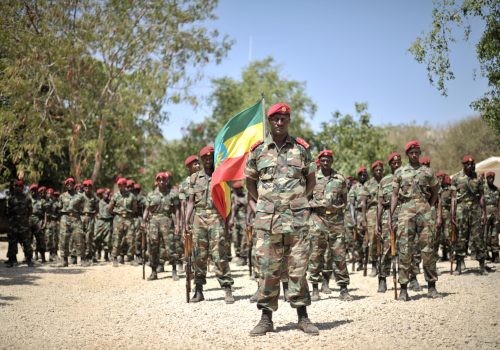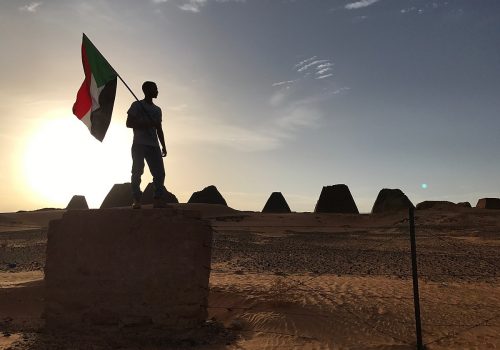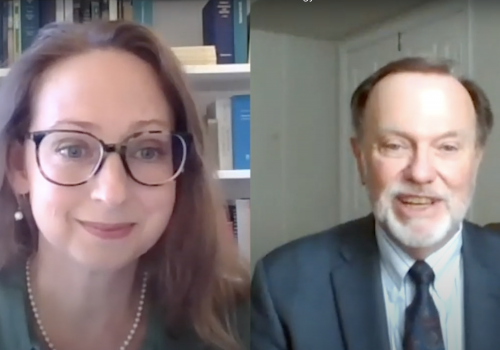African agency in the new Cold War: Traditional power competition in the post-COVID-19 African landscape
Executive summary
Since the end of the Cold War, a handful of powers have been able to exert influence across the whole of the African continent: the United States, China, the European Union (EU), and India. These external powers have rarely competed directly against each other, as they have exercised influence in well-defined, separate spheres: The United States has held the soft power advantage for its aid and security assistance; China in infrastructure and increasing trade; India in the mercantilist activities of its diaspora; and Europe as an ally of the United States focused on countering irregular migration.
The resource-scarce post-COVID environment will accelerate competition between these powers and lead them into intersecting spheres of influence. Even with an incoming Joseph Biden administration, the United States is set for declining influence on the continent, creating a vacuum for Europe and China to either willingly or begrudgingly fill. Budget constraints on aid and defense, complemented by a shifting strategic emphasis toward great power competition, will lead the United States to scale down its security and development assistance in nonstrategic nations, instead urging American businesses to compete head on with Chinese firms in the marketplace. China, in turn, will be faced with an opportunity to ramp up its security
assistance and will try to forge a new soft power advantage. This will be meant to overcome growing reputational concerns over debt relief and as a means to maintain the support of the African voting bloc in the United Nations as China faces enhanced global scrutiny. Europe may diverge more from the United States as it, too, is forced to carry a greater counterterrorism burden and seeks to combat a new surge of irregular migration, possibly nudging NATO to expand its footprint as well. And India will emerge from COVID-19 with a compelling value proposition for African nations seeking new economic partnerships.
Some African nations will find themselves in the crosshairs of a new Cold War mentality that could threaten regionalization and the blooming ethos of pan-Africanism. Key countries that will be implicated include Kenya, Ethiopia, Nigeria, South Africa, Senegal, and the Democratic Republic of the Congo (DRC). Their pursuit of bilateral versus pan-African interests will be decisive in setting the continent’s trajectory—toward a new African Century, or another period of thwarted ambitions.
This paper explores the shifting roles of Africa’s traditional external powers: China, the United States, the EU, and India. Section 1 introduces the evolving postures and colliding interests of these powers. Section 2 maps out the competitive post-COVID landscape and outlines economic and security flashpoints. Finally, Section 3 identifies opportunities for African nations to pursue their own ambitions while resisting the imposition of a new Cold War–style competition on the continent. These opportunities include the following:
● Building off collaborative pan-African initiatives created in response to COVID-19
● Advancing trade integration through the African Continental Free Trade Area
● Competing for select supply chains as countries seek diversification from China
● Promoting self-sufficiency by prioritizing agribusiness
● Taking advantage of South-South cooperation to boost trade and investment
● Realizing African leverage in debt negotiations with China
● Managing tech competition to avoid alienating the United States or China
A twin analysis by the Policy Center for the New South explores the repositioning of the emerging powers in Africa in the wake of COVID-19.
Report author
Related content

The Africa Center works to promote dynamic geopolitical partnerships with African states and to redirect US and European policy priorities toward strengthening security and bolstering economic growth and prosperity on the continent.
Image: Workey Tadele, a radio operator, at the Grand Ethiopian Renaissance Dam (GERD), near Guba in Ethiopia, on December 26, 2019. The Grand Ethiopian Renaissance Dam, a 145-metre-high, 1.8-kilometre-long concrete colossus is set to become the largest hydropower plant in Africa. Across Ethiopia, poor farmers and rich businessmen alike eagerly await the more than 6,000 megawatts of electricity officials say it will ultimately provide. Yet as thousands of workers toil day and night to finish the project, Ethiopian negotiators remain locked in talks over how the dam will affect downstream neighbors, principally Egypt. Photo: Eduardo Soteras/AFP via Getty Images.


